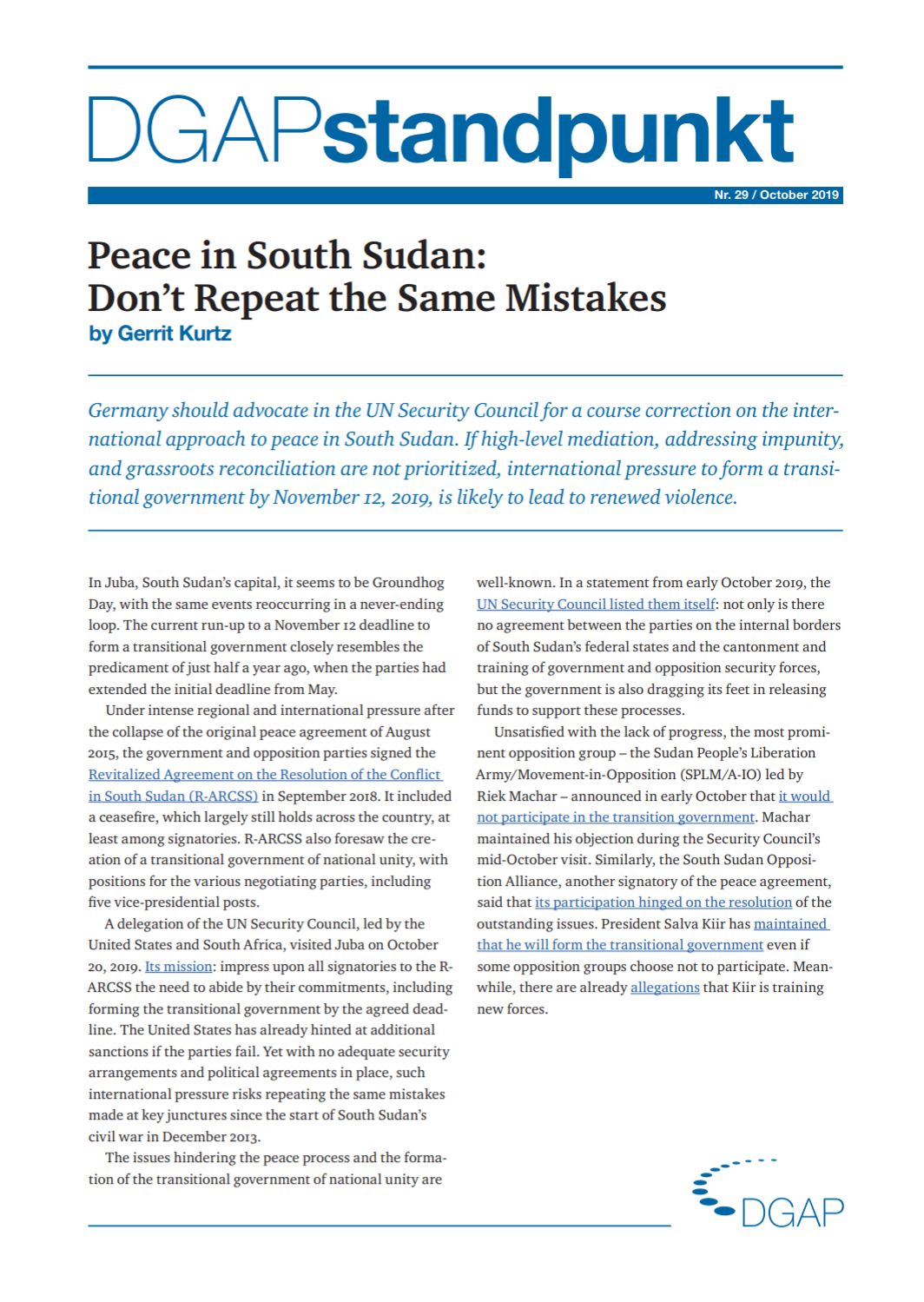In Juba, South Sudan’s capital, it seems to be Groundhog Day, with the same events reoccurring in a never-ending loop. The current run-up to a November 12 deadline to form a transitional government closely resembles the predicament of just half a year ago, when the parties had extended the initial deadline from May.
Under intense regional and international pressure after the collapse of the original peace agreement of August 2015, the government and opposition parties signed the Revitalized Agreement on the Resolution of the Conflict in South Sudan (R-ARCSS) in September 2018. It included a ceasefire, which largely still holds across the country, at least among signatories. R-ARCSS also foresaw the creation of a transitional government of national unity, with positions for the various negotiating parties, including five vice-presidential posts.
A delegation of the UN Security Council, led by the United States and South Africa, visited Juba on October 20, 2019. Its mission: impress upon all signatories to the R-ARCSS the need to abide by their commitments, including forming the transitional government by the agreed deadline. The United States has already hinted at additional sanctions if the parties fail. Yet with no adequate security arrangements and political agreements in place, such international pressure risks repeating the same mistakes made at key junctures since the start of South Sudan’s civil war in December 2013.
The issues hindering the peace process and the formation of the transitional government of national unity are well-known. In a statement from early October 2019, the UN Security Council listed them itself: not only is there no agreement between the parties on the internal borders of South Sudan’s federal states and the cantonment and training of government and opposition security forces, but the government is also dragging its feet in releasing funds to support these processes.
Unsatisfied with the lack of progress, the most prominent opposition group – the Sudan People’s Liberation Army/Movement-in-Opposition (SPLM/A-IO) led by Riek Machar – announced in early October that it would not participate in the transition government. Machar maintained his objection during the Security Council’s mid-October visit. Similarly, the South Sudan Opposition Alliance, another signatory of the peace agreement, said that its participation hinged on the resolution of the outstanding issues. President Salva Kiir has maintained that he will form the transitional government even if some opposition groups choose not to participate. Meanwhile, there are already allegations that Kiir is training new forces.
Déjà Vu of the Original Peace Agreement
The current peace deal risks sharing the fate of the original peace agreement of August 2015, which quickly collapsed three years ago amid the escalation of fighting, spread of violence, and fragmentation of the parties involved. Then, international pressure brought Kiir, Machar, and a smaller opposition group together to sign this agreement, which included a ceasefire, a power-sharing arrangement, and a commitment to establish a hybrid court under the aegis of the African Union. As became clear in the following months, the parties never intended to follow through with many of these commitments. Worse, the regional and international guarantors of the agreement let them get away with it.
Barely two months after he signed the peace agreement, President Kiir announced the reorganization of South Sudan’s federal states, increasing their number from 10 to 28. As the power-sharing arrangements were tied to the original number, his move was a clear violation of the peace agreement. Furthermore, the government failed to withdraw the bulk of its security forces from Juba to cantonment sites on its periphery. Machar and Kiir agreed on security arrangements that brought hundreds of opposition forces to Juba to guarantee the safety of Machar and his team, further militarizing the capital.
Under international pressure and in a weak military position, Machar went to Juba in April 2016 to form a unity government. The arrangement proved to be deeply dysfunctional. When Machar’s and Kiir’s forces clashed at an illegal checkpoint in the city in July of that year, heavy fighting broke out, during which hundreds of civilians and fighters were killed. Machar fled Juba accompanied by a contingent of his rebels, with government security forces in close pursuit. The government later revealed that it had paid Paul Malong, then chief of military staff, five million US dollars directly from the central bank to pursue and kill Machar, then the country’s first vice president.
International and regional reactions to these events were underwhelming. Beyond verbal criticism, there were neither repercussions for Kiir’s reorganization of state borders, nor for the July 2016 crisis. In addition, international and regional partners implicitly accepted that Taban Deng Gai, who had represented the opposition during the peace negotiations, had replaced Machar as first vice president while Machar was on the run.
Waking Up from Groundhog Day
Around 380,000 people are estimated to have died because of South Sudan’s civil war. The South Sudanese need a different international engagement. Germany supported the negotiations that led to the revitalized peace agreement last year with expertise and additional staff for the African Union (AU) and the Intergovernmental Authority on Development (IGAD), the regional organization in the Horn of Africa. As a donor and a current non-permanent member of the UN Security Council, Germany – along with its European partners – now has the chance to steer international policymaking on South Sudan in new, more effective directions.
First of all, in partnership with the AU and IGAD, the Security Council needs to push for continuous mediation between the parties. Security arrangements and the internal political order were already at the heart of the failure of the previous transitional government. Therefore, it is baffling that IGAD has not yet managed to appoint a permanent head of the peace agreement’s monitoring body. South Sudan should not just be seen as an issue to shape US Ambassador to the UN Kelly Craft’s public profile; rather, it deserves sustained political attention from the region, as well as from international decision-makers, including in Europe. There is no shortcut around negotiations between the parties. High-level mediators not only need to bring all the main players to the negotiating table until there is a consensus, but they also need to quickly follow-up with sanctions in the event of serious violations.
Secondly, donor countries like Germany need to spell out their conditions for support of the peace process more explicitly. Right now, the South Sudanese parties shape the narrative by calling for international donors to release further funds for the implementation of the peace agreement, in particular the retraining of government and opposition forces. Instead, donors should insist on the South Sudanese government’s pledge to release 100 million US dollars for this process. While the government currently spends millions on a presidential jet and foreign medical treatment for MPs, it is neither paying security services nor providing sufficient food and water at cantonment sites. Any support of the peace process by external donors should be bound to financial audits and transparency of South Sudan’s oil sector.
Thirdly, peacemaking in South Sudan needs to move away from a purely transactional model of power-sharing, in which government positions are meted out to the parties according to their negotiating strength. As Lotje de Vries and Mareike Schomerus argued in 2017, a peace deal alone will not end the war in South Sudan. Europe needs to follow the US example by going after the cash flows funding the violence more aggressively than in the past. Thanks to investigations by the Sentry, a US civil society organization; the panel of experts appointed by the UN Security Council; and the UN Human Rights Commission on South Sudan, detailed evidence already exists of the patronage networks benefiting from the civil war. The EU should freeze the assets of more corrupt members of the South Sudanese elite. Addressing impunity by getting the proposed hybrid court on South Sudan up and running under the aegis of the African Union also deserves a higher priority.
International pressure on the parties needs to focus on resolving the outstanding issues, not on forming a bloated transitional government with minimal trust. Machar can be forgiven for not trusting the UN’s assurance of his and his team’s safety if they return to Juba. In July 2016, UN troops were bogged down amid the urban fighting in the city and did not even intervene to halt an assault on humanitarian and UN workers at a nearby compound, let alone protect civilians in the vicinity of its camps. While the UN Mission has been bumped up to include additional forces with a robust mandate and improved procedures, it is unclear whether these forces would be able to engage with the thousands of government troops stationed in Juba if the 2016 scenario were to repeat itself.
For the moment, sustaining the ceasefire needs to have priority. It has enabled the conclusion of more than 130 local reconciliation efforts in South Sudan’s myriad inter- and intra-communal conflicts. The UN Mission in South Sudan, as well as the South Sudanese Council of Churches, has supported many of these efforts. Both deserve the Security Council’s full political support. Over time, local peace agreements can help build national peace and development from the ground up – until, one day, South Sudan can break the loop of renewed violence for good.

